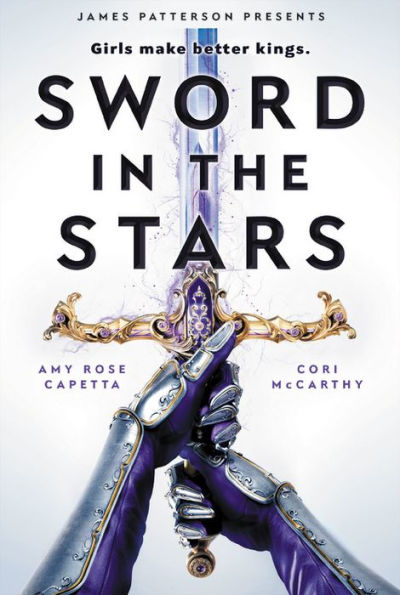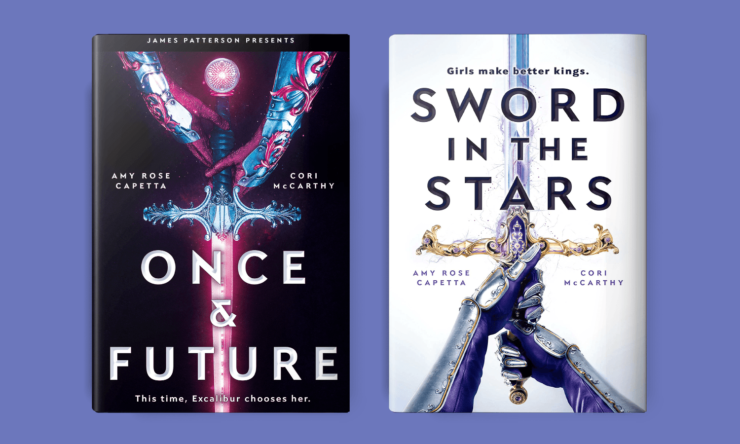I wish I had Cori McCarthy and Amy Rose Capetta’s Once & Future and Sword in the Stars when I was a teenager. This duology would’ve changed my whole life in myriad ways if it fell into my hands in high school. I needed a book full of badass, racially diverse, queer, feminist teens taking on fascism and the patriarchy like Arthur needed Excalibur. Although I’m almost two decades away from my teen years now, I’m still so, so, so happy I get to have this series in my life.
(Some spoilers for Once & Future ahead!)
When we last left our intrepid heroes, they were hurtling through time and space. Mercer laid claim to Gwen’s unborn baby, Merlin was getting precariously younger, and Ari was ready to end the Arthurian reincarnation cycle once and for all. They land in Medieval era Britannia and congregate at the court of the suspiciously young King Arthur. Of course there’s a quest (what hero’s journey would be complete without one), this time to steal the Holy Grail. But the past has its own plans.
Buy the Book


Sword in the Stars
The Middle Ages aren’t what the space kids expect, nor what Merlin remembers. In fact, he remembers almost nothing, as if his memories were blocked or erased. Ari finds herself in an uncomfortable love triangle with King Arthur and Gwen, Val is stuck watching his boyfriend get younger with every spell he casts, Jordan is forced to play the mild-mannered maid, and Lam is perpetually misgendered. But there are good things, too, like friendship and loyalty and a desire to do better. The teens shape the past, but the past shapes them as well. As Ari faces down with her nemeses past and future, she uncovers the truth buried beneath the myth and the lies beneath the legend.
Capetta and McCarthy examine what makes a person a villain, in part by critiquing the hero’s journey and the very concept of heroism. We see women and nonbinary characters attempting the same course of action as their (white) male counterparts only to hit the wall of patriarchy. Arthur’s life was not easy by any means, but with the support of the all-powerful Merlin and a social system founded on the premise that prioritizes men he started his journey from a place of privilege and convenience. Ari had no such privilege; even with Merlin helping her out, she begins the second book with even less social capital as a woman than newly crowned teenage King Arthur. In short, she (and other characters like Gwen, Lam, Jordan, Val, and another character with an epically large chip on their shoulder) have to work twice as hard to get half as much.
What comes so easily to Arthur is an endless fight for another character whose identity I won’t reveal for spoiler reasons. They attempt the hero’s journey and is denied again and again by men who have summarily decided they are unworthy of such privilege. So they skip the journey and go straight for the power, thereby forcing them into the role of villain. But are they really? In a way they merely traded one set of shackles for another. As a child they were trapped by the patriarchy and as an adult they are trapped in a prison of their own making. Does that make them evil? Or does it make them human?
Folded into the question of villainy is the exploration of family, blood and found, messy and tight-knit. Capetta and McCarthy demonstrate numerous ways families exist and how they all fall somewhere on the spectrum between acceptance and rejection. For many people (those with marginalized identities especially) that spectrum can feel like a minefield. The family they’re born into may not be the family that accepts them, and it might take years and repeated failures before they forge the family that does. Some are lucky enough to have a blood family that loves them and a found family that respects them. And some, sadly, never get either. Merlin and Ari spend lifetimes looking for family, and find theirs in people they didn’t expect. Both are looking for a very narrowly defined definition of family – parents and child – but wind up with a broad coalition of friends and loved ones who love unconditionally. In the first book neither believe they deserve family, but by the end of the second book family is the thing they long for the most.
Structurally and tonally, Sword in the Stars feels different – yet complementary – to Once & Future. Where the first book was heavy on action and adventure, the second favors heavy emotions and moments of contemplation and introspection. Despite having a larger cast, the second book is less frantic and energetic but still just as propulsive and engaging. It is more interested in the whys and whens than the hows and whats. Although it might be slightly too cluttered, it refrains from becoming overwhelming or convoluted. Sword in the Stars brings the story to several unexpected yet welcomed conclusions, tying up threads readers didn’t even realize were still loose and giving everyone the future they earned.
Sword in the Stars is a nearly perfect book to complete a nearly perfect duology. As much as I didn’t want to put the book down, I also desperately wanted to savor the experience as long as I could. This immersive, expansive, and vividly written young adult space opera turned sword and sorcery historical fantasy is laden with queerness and racial diversity. Sword in the Stars is a must-read. Amy Rose Capetta and Cori McCarthy are powerhouse authors in their own rights, but together they are nigh unstoppable.
Once & Future and Sword in the Stars are available from Jimmy Patterson.
Alex Brown is a teen services librarian by day, local historian by night, author and writer by passion, and an ace/aro Black woman all the time. Keep up with her on Twitter and Insta, or follow along with her reading adventures on her blog.










